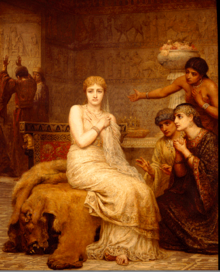Vashti
| Vashti | |
|---|---|
| Queen of Persia | |

Vashti Refuses the King's Summons by Edwin Long
|
|
| Queen of Persia | |
| Predecessor | Amestris |
| Spouse | King Xerxes I of Persia |
| House | Persia |
| Religion | Zoroastrianism |
Vashti (Hebrew: ושתי, Koine Greek: Αστιν Astin) was Queen of Persia and the first wife of Persian King Ahasuerus in the Book of Esther, a book included in the Tanakh (Hebrew Bible) and read on the Jewish holiday of Purim. She was banished for her refusal to appear at the king's banquet to show her beauty as the king wished, and Esther was chosen to succeed her as queen. In the Midrash, Vashti is described as wicked and vain. She is viewed as an independent-minded heroine in feminist interpretations of the Purim story.
In the Book of Esther, Vashti is the wife of King Ahasuerus. While the king holds a magnificent banquet for his princes, nobles and servants, she holds a separate banquet for the women. On the seventh day of the banquet, when the king's heart was "merry with wine," the king orders his seven chamberlains to summon Vashti to come before him and his guests wearing only her royal crown, in order to display her beauty. Vashti refuses to come, and the king becomes angry. He asks his advisers how Vashti should be punished for her disobedience. His adviser Memucan tells him that Vashti has wronged not only the king, but also all of the husbands of Persia, whose wives may be encouraged by Vashti's actions to disobey. Memucan encourages Ahasuerus to dismiss Vashti and find another queen. Ahasuerus takes Memucan's advice, and sends letters to all of the provinces that men should dominate in their households. Ahasuerus subsequently chooses Esther as his queen to replace Vashti.
King Ahaseurus's command for the appearance of Queen Vashti is interpreted by several midrashic sources as an order to appear unclothed for the attendees of the king's banquet. Though it was common in the culture for dancers to entertain the king's guests, the Persian custom that "the queen, even more than the wives of other men, was secluded from the public gaze" suggests that this command was highly inappropriate.
...
Wikipedia
